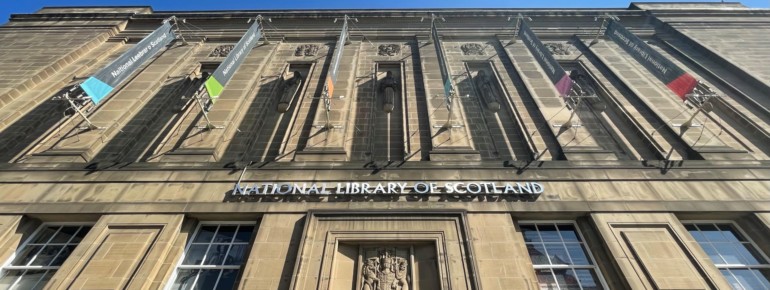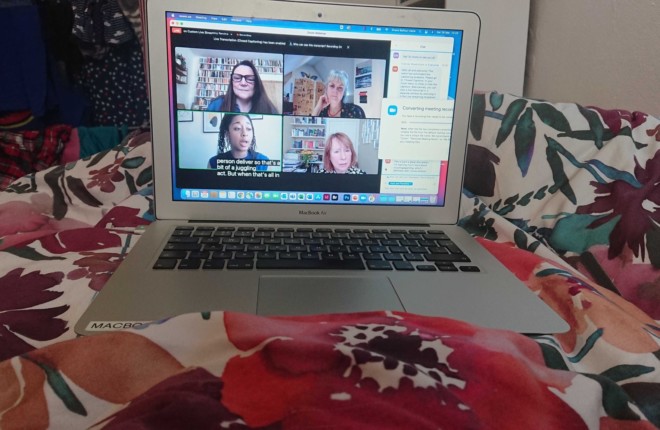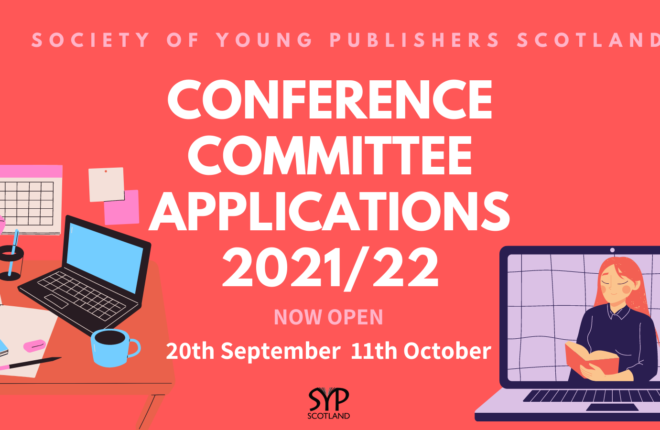
Q: How can a library grow a collection of 34 million items? A: Legal Deposit!
Posted on January 26, 2022 in Scotland


Thousands of items arrive into the National Library of Scotland each week in neatly packed crates. The publications inside cover every conceivable topic, from Government policy to gardening to geometry. They vary in format, from a single sheet to the thickest multi-volume encyclopaedia. The one thing that the contents of the crates all have in common is that they have been collected under Legal Deposit Regulations and have been collected for us by the Agency for the Legal Deposit Libraries.
Legal Deposit is the bedrock of the National Library of Scotland and explains the size and variety of our collections today. The legislation has been around for centuries in some form in Scotland, with the Advocates Library in Edinburgh (our predecessor and still serving the Faculty of Advocates today) first granted the privilege to collect in this way in 1710. With the advent of the digital age, Legal Deposit has been extended to cover electronic and other non-print publications following the passing of the Legal Deposit Libraries Act 2003 and the Legal Deposit Libraries (Non-Print) Regulations 2013. In addition to e-books, e-journals and other electronic publications, the regulations cover UK websites and web content, which we collect via collaborative web archiving.
We also benefit from reciprocal UK–Irish collecting under the UK legislation and Irish Copyright and Related Rights Acts 2000 to 2019 enabling each country to collect UK and Irish publications and benefiting both countries.
The Acts name six Legal Deposit libraries across the UK and Ireland: the British Library, National Library of Wales, Bodleian Library at University of Oxford, Cambridge University Library, the Library of Trinity College Dublin and the National Library of Scotland.
So what does this mean in practice for publishers in Scotland? The National Library of Scotland, along with the other Legal Deposit Libraries, is entitled to receive, free of charge, a copy of everything published in the UK and the Republic of Ireland. With the exception of the British Library, Legal Deposit Libraries must make the request in writing and within a year of publication.
To coordinate this work, the Edinburgh-based Agency for Legal Deposit Libraries (ALDL) claims and receives titles from publishers on behalf of all the Legal Deposit Libraries, except for the British Library who have their own Legal Deposit Office. This enables publishers to send five copies of each work to just one location, with ALDL handling the onward distribution to each Legal Deposit Library.
By default, under the terms of the 2003 Act and 2013 regulation, publishers should send titles in print format, unless agreed otherwise. Since 2013, a large number of mainstream e-book and e-journal publishers have transitioned from print to digital deposit, following agreement between the publisher and libraries. Of course, a significant amount of publishing is now electronic only, whether as PDF, ePub or online HTML documents, in which case the electronic copy is liable for deposit automatically. The majority of large UK publishers deposit their electronic content via the British Library, who host the shared collecting and access infrastructure for electronic publications on behalf of all the Legal Deposit Libraries, with content being replicated across servers at the national libraries of Wales and Scotland.

The National Library of Scotland is responsible for collecting Scottish electronic publications, and we value building close working relationships with publishers across Scotland. We ask that Scottish publishers who wish to enquire about Legal Deposit, in either print or electronic format, contact the Library direct via our Acquisitions Team who can be reached at acq@nls.uk. For electronic publications, our new web-based deposit tool, Digital Deposit Scotland, makes it quick and easy for Scottish publishers to send us publications for our collections. Electronic titles sent to the National Library of Scotland in this way are distributed to the other Legal Deposit Libraries via our shared infrastructure, benefitting all parts of the UK.
Legal Deposit is an amazing collecting mechanism which benefits the Legal Deposit Libraries, the people of Scotland and the UK, and also has many benefits for publishers. Publications deposited to the National Library of Scotland are held in perpetuity, meaning that a copy of your publication will exist safely in our stacks or on our servers. It will become part of the nation’s heritage – secured for future generations as well as today’s readers and researchers.
If you send a print or electronic publication to us, under the terms of Legal Deposit it can only be accessed in the Library’s Reading Rooms and can’t be downloaded or taken home, further adding to the level of security for your publications. Due to the restrictions this places on public access, particularly for Scottish readers located outside Edinburgh or Glasgow – where our public buildings are located – we encourage Scottish publishers to permit us to extend access to electronic publications for readers at home. Many non-commercial publishers and organisations have agreed to this, which helps their titles reach a broader audience and means we don’t lock down content that is intended for open and unrestricted access. There is no obligation to agree to this and, by default, titles are restricted to Reading Room access unless otherwise agreed.
All of the deposited publications have a catalogue record created and added to our online discovery service, Library Search. This means that publications are discoverable for an audience not just in Scotland but worldwide (and a nice bit of free promotion!). Most of the deposited books and new serial titles will also be listed in external databases such as JISC Library Hub Discover, OCLC WorldCat and the British National Bibliography (BNB) which is used by librarians and the book trade for stock selection.
The National Library of Scotland also carries out its own specialist Legal Deposit collecting activities. A recent example was collecting flyers and manifestos from the 2021 Scottish Parliament Election. We are also collecting items about and produced due to the Coronavirus pandemic, with the aim of reflecting the nation’s shared experience of the pandemic on everyday life. This includes collecting print and electronic publications about public health information, Covid-related business signage, charitable community appeals, and information relating to changed local services, and includes a collaborative element for web-based content due to the global nature of the collection. We also routinely collect publications such as football programmes, Edinburgh Festivals flyers, publications by Scottish charities and community groups and other political materials, for example publications from the 2014 Scottish Independence Referendum. A current project is collecting publications from the COP26 Summit held in Glasgow this year, and will again include print, electronic and web-based content, as do many of our event-based or special collections. We collect these publications to build a representative and varied national collection for current and future readers and researchers.
We have slightly different arrangements for collecting websites and geospatial map data. Map data is available via the Legal Deposit Libraries Map Portal, with access restricted to Library Reading Rooms, and web content is available via the UK Web Archive, which has a mix of public access and onsite-only content.
If you have any questions about anything in this blog post, please feel free to contact the Acquisitions Team at the National Library of Scotland. We are a friendly bunch and always happy to help. Our contact details (and further information about Legal Deposit) can be found at the following webpages:
As mentioned, the British Library has slightly different Legal Deposit collecting arrangements from the other Libraries. For further information about the British Library specifically, please see the following links:



 Listen to the podcast
Listen to the podcast  Explore the Youtube channel
Explore the Youtube channel